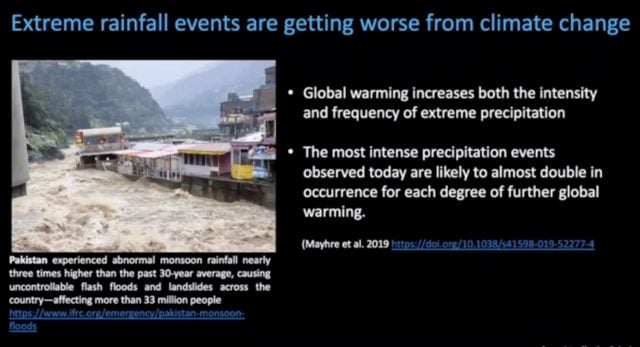
It is a simple equation: an atmosphere with more water in it makes more rain. The impact of climate warming is that more water rises from the earth’s surface and is held in the atmosphere. But as they say what goes up, must come down. The problem is that in a warming atmosphere when the rain comes down, larger amounts of water come down at once and you experience flooding like February and March 2022 – more water in shorter periods of time. This leads to higher flood levels and landslides.
It is estimated that for every degree of warming there is a seven per cent increase of water in the atmosphere.
‘Currently we are living the consequences of 1.1 degree global warming,’ Brendan Mackey, Director of the Climate Action Beacon, Griffith University, Queensland and a Coordinating Lead Author for the 2022 Intergovernmental Panel on Climate Change (IPCC) 6th Assessment Report from Working Group II – Impacts, Vulnerability and Adaptation explained during a recent webinar on floods and farming for Farmers for Climate Action.

‘Unfortunately extreme rain and flooding will continue to get worse for decades to come as we have at least another 0.4 degrees of global warming locked in that is likely to be reached by 2030 – in the next ten years.
‘What happens with climate change is that patterns of rainfall are changing but it is not the same everywhere. A warmer world is actually a wetter world overall but also [with] more extreme droughts in some places and more extreme rainfall in others.’
Increases in rainfall have been seen in north-western Australia and decreases have been seen in equatorial Africa and southern Asia. Daily rainfall associated with thunderstorms has increased 13–24 per cent between 1979–2016, particularly in northern Australia (Dowdy 2020).
Landslides are caused by ‘pluvial’ or ‘flash flooding’ rather than the standard river rising flood which is ‘fluvial’ flooding. The combined cost of flooding is estimated at $8.8 billion a year. The risks of both types of flooding are increasing with the rising global temperatures.
Not only have we seen the impacts of the increase in intensity here in the Northern Rivers in February and March this year, we have also just witnessed the devastating impacts on farmers throughout NSW, Queensland and Victoria as the recent flooding has destroyed crops and farms.
Chloe Fox a farmer in Seymour Victoria described how the flooding of the Goulburn River on 12 October devastated their organic farm. She said that in the seven years they had been there the water had never impacted the farm but this time ‘the water was higher than my head’ and it ‘remained for five days. It was like being in a lake – you wouldn’t realise there was a farm under there. We’ve only dropped below minor flood level in the last week and a half.’
The loss of the garlic crop alone was valued at $100,000 but she said that it would be ‘too heartbreaking to work out the total loss’ they have had.
‘We lost 4–5 months of vegetable production. We should be getting back to production by January,’ said Chloe.

Intense events to double
‘The most intense precipitation events observed today are likely to almost double in occurrence for each degree of further global warming,’ explained Brendan.
‘The increase in global temperature, and in Australia’s temperature, is exacerbating all extreme events that Australia is experiencing: heatwaves, bushfires, droughts, and floods.
These are all getting either more frequent, more intense, or of longer duration as these climate trends continue.
‘Current global policies, even if implemented, will result in global warming of 3.2 degrees by 2100. With recent enhanced ambitions it is reduces to two-and-a-half degrees; but it is well above the current levels.
‘If you go back to the year 2002 we had 0.6 degrees of global warming. And in 2022 it is 1.1 degrees, that is about an increase of 0.5 degrees warming over 20 years. We are going to see another 0.4 [degrees] happen in the next eight to ten years. We are going to see as much climate change in the next eight to ten years as we’ve seen in the last 20 years. So just think about how much worse the heatwaves have got, the bushfires have got, the droughts have got, and the floods have got – well we are going to see continuing worsening in the next decade.’
While Chloe said they will build back as resiliently as they can on their farm she acknowledged that ‘we can’t stop the Goulburn River if it decides to flood’.
Chloe said that more accurate predictions of flood risks would be helpful as the October flood had been ‘warned as a minor flooding event’.
To achieve that Bredan said that it comes down ‘in part to investment in monitoring equipment. It will require a lot more instrumentation in both rainfall and flooding and having systems that can feed into the models in real time. I think it is going to be a while before we have the systems in place to do this.’
The full webinar is available on the Farmers for Climate Action website: https://




This is sadly 100% accurate. But if you dare to protest in the police state aka NSW you will be jailed. Countries like Iran, Russia and China must be looking at this “great” (sic) state with admiration and wondering where they went wrong.
Iran, the leaders in cracking down on public protesting dissent – reports that an arrested protester has been executed.
Just waiting for Premier Perrottet to weigh in with his support and add this further sanction to the NSW anti-Protest Law.
Yes. The great Southern Land now welcomes Soviet Russia.